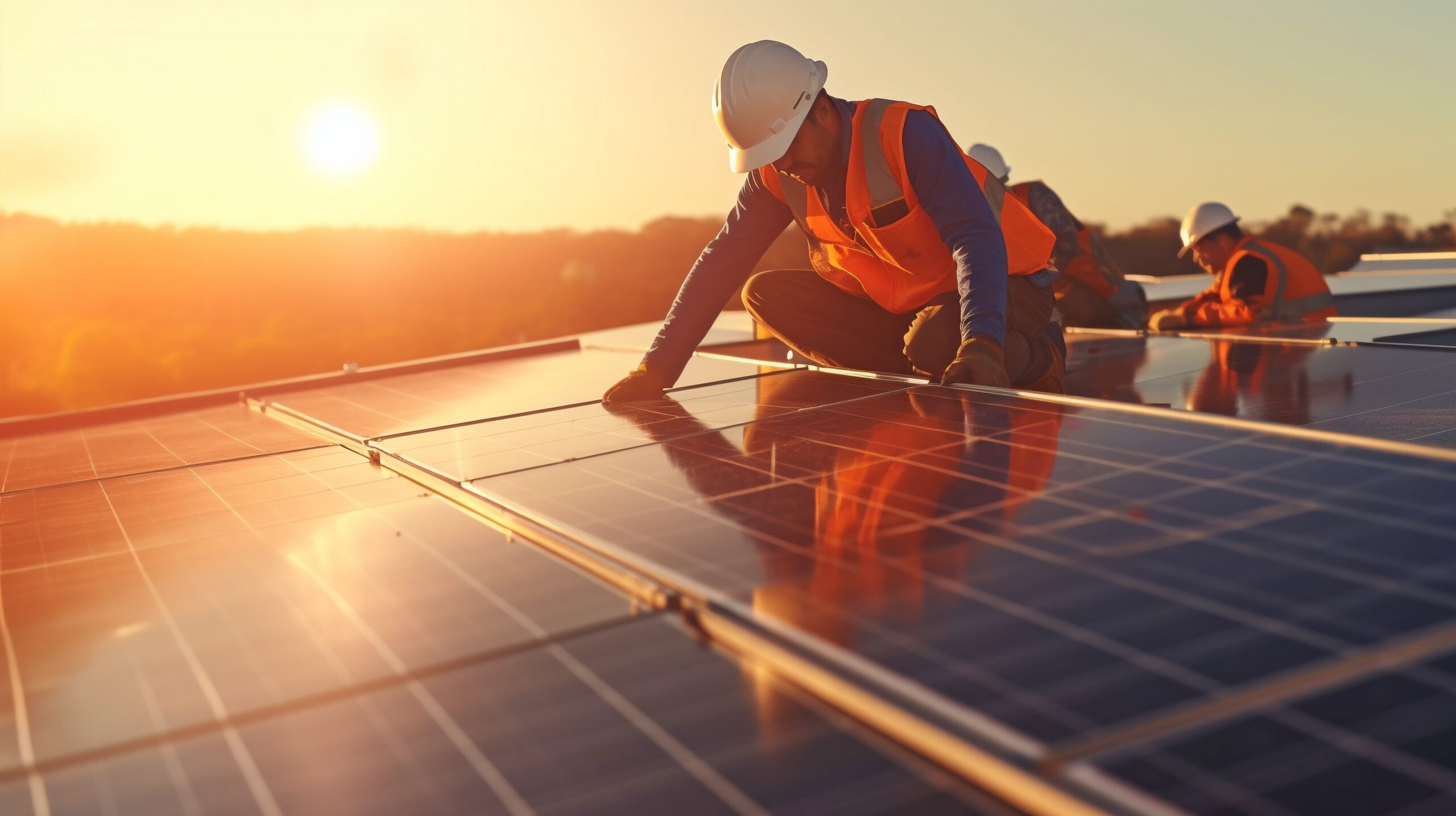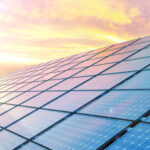Solar panel efficiencies have been steadily improving for over a decade. Today, most solar
panels on the market have a conversion efficiency rate of over 22%, and typically come with
warranties of 10-25 years, ensuring high power output and reliability. When installing a solar
system, it is important to understand what determines a solar panel’s efficiency, how higher
efficiencies generate more solar energy, and how they provide greater savings on your utility
bill.
What is Solar Panel Efficiency?
Simply put, solar panel efficiency measures how much sunlight hitting a solar panel is
converted into usable electricity. Currently, most popular solar panels have a conversion
efficiency of around 22-24%, meaning that 22-24% of the sunlight is converted into solar
electricity. While this may seem low, it represents the upper limit of current technology.
Solar panel efficiency is determined by the type of solar cell used, the cell layout, the
configuration of the cells, and the overall size of the panel. Many factors interact within the
solar panel when capturing sunlight, which we will examine below.
Which Type of Solar Panel is Efficient?
A solar panel’s efficiency is primarily determined by its solar cells, which are either made
from polycrystalline (multicrystalline) or monocrystalline silicon. Monocrystalline silicon cells –
used by AMPS – offer higher efficiencies because they are made from pure silicon, with fewer
impurities and a more uniform black color than multicrystalline cells. They also provide more
power per square foot, and as the market has adopted this technology, prices have fallen to
near parity with multicrystalline. The widespread adoption of monocrystalline solar panels in
recent years has helped push solar panel efficiencies higher.
Another type of solar panel is the thin-film solar panel, which uses a different composition to
achieve the photovoltaic effect. However, these panels are not widely used in rooftop solar
installations.
Why Solar Panel Efficiency Matters
If you have limited roof space, maximizing solar power generation is crucial. This is why solar
panel efficiency matters. The more efficient a solar panel, the better it is at converting sunlight
into electricity, leading to higher electricity generation and a better return on investment.A solar system with lower efficiency panels can produce as much power as a system with
higher efficiency panels, but it will require more panels, increasing costs and space
requirements.
Factors Affecting Solar Panel Efficiency
Several factors affect solar panel efficiency. Research and development teams worldwide work
for years to develop higher-efficiency solar cells. This process is highly technical, but for the
end customer, it pays to know how the cells work and how they affect a solar panel’s overall
efficiency.
The type of solar cell used is the biggest determinant of a solar panel’s efficiency. AMPS
uses monocrystalline cells to achieve efficiencies of 22% or more. These cells offer a sleek,
uniform black aesthetic that enhances the conversion process, increasing the amount of
sunlight converted into electricity.
Other techniques that boost solar panel efficiency include using half cells, which are simply
solar cells cut in half, reducing the current flowing through the cell and lowering resistive
losses, thereby increasing efficiency. Solar panels with half-cells also perform better under
shaded conditions.
Solar panels with small gaps between the cells can also boast higher efficiencies, especially
when paired with round interconnection wires that reflect less sunlight away from the cell
compared to flat ribbon-style wires.
Other factors affecting solar panel efficiency include the type of inverter used, solar cell
temperature (cells that are too hot exhibit reduced efficiency), and the layout of the system.
Solar Panel Design
The design of a solar panel can influence its efficiency. Panels using half cells are more efficient
than those using full cells due to lower currents in the cells, leading to lower resistive losses
and higher conversion efficiency.
The color of the backsheet, the protective layer on the back of a solar panel, also affects
efficiency. Black backsheets, used primarily for aesthetics, reduce efficiency slightly because
black absorbs more sunlight and heat than white or other colors, making the panel warmer
and slightly less efficient.
Temperature
Solar panels perform optimally in direct sunlight within an ideal temperature range. A solar
panel that is too hot will lose efficiency. The optimum temperature range for peak performance is 25 °C or 77 °F. For every degree Celsius above this, a solar panel loses about
0.3% to 0.5% efficiency because high temperatures cause electrons inside the solar cell to
behave erratically, reducing voltage. Other electrical components in the panel are also
affected by high temperatures.
Solar panels are more efficient in cold weather. A cold, bright day is ideal for solar panels.
However, colder days are usually shorter and less sunny, so solar panels are more effective in
warmer climates where the days are longer and sunnier.
Positioning and Angle
Solar panels perform better when positioned and angled to optimize access to uninterrupted
sunlight. However, environmental factors can influence the most optimal position and angle.
In the United States, it is best to have solar panels facing true south for peak sun exposure.
True south differs from magnetic south, which is indicated by a compass. True south for solar
panels means facing the geographic south, directed toward the South Pole.
If true south isn’t possible, having panels face east or west (or both) is also acceptable,
though there is a slight decrease in efficiency. We don’t recommend facing your solar panels
to the north, as this significantly reduces efficiency.
Shade
Shaded solar panels produce less electricity. They work on cloudy days but are most efficient
on clear, sunny days. Shadows from neighboring objects can also affect output, so installers
should consider potential shadow falls when planning your rooftop solar system.
Solar panels with half cells perform better in shaded conditions because the way the cells are
interconnected means a shadow only affects one half of the panel, not the other.
Special inverter technology called Module Level Power Electronics (MLPE) can also boost
performance in shaded conditions. This includes microinverters and power optimizers. MLPE
ensures each solar panel operates at optimal capacity without affecting the rest of the system.
If one panel is shaded, the others remain unaffected.
How to Check Solar Panel Efficiency
Calculate Theoretical Efficiency
The theoretical efficiency of a solar panel is higher than the actual efficiency, reaching around
33%. Current panels cannot achieve this rate, but the calculation is useful for installers planning
a solar system. To calculate theoretical efficiency, divide maximum power output (up to 500 W) by rated power (listed in watts on the panel’s datasheet) and multiply by 100.
Calculate Actual Efficiency
The actual efficiency of most solar panels today is usually between 22-25%. This is calculated
by dividing measured power output (voltage x current) by rated power, then multiplying by
Compare Theoretical and Actual Efficiency
Comparing theoretical and actual efficiency helps determine the overall output of your solar
system. A panel with higher actual efficiency is less likely to be negatively impacted by shading,
soiling, high temperatures, or other external factors that reduce performance.
Why Aren’t Solar Panels 100% Efficient?
To reach 100% efficiency, solar panels would need to convert all sunlight into electricity. This
is impossible because sunlight disperses in various ways. Modern panels can harvest up to 25%
of the solar spectrum into electricity, with next-generation panels pushing efficiencies to 30%
and beyond.
Contact Us
If you are interested in installing AMPS solar panels on your home or have questions about
solar energy, our team is here to help. We are dedicated to developing high-quality solar
panels, providing outstanding solar solutions, and delivering exceptional customer service
because we understand the importance of switching to clean energy and its positive
environmental impact.
Browse our complete solar energy solutions, including solar panels, home energy storage,
and energy management, or contact us to discuss designing and installing a customized
home solar panel system. Feel free to reach out to AMPS for any solar-related questions you
may have






Leave a comment